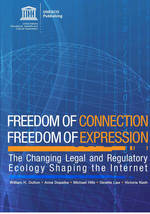Internet Freedom: Law and Regulation
UNESCO takes the responsibility to explore the changing legal and regulatory framework of Internet and provide member states with policy recommendations aiming to foster a conducive environment to freedom of expression on the net.
Freedom of Connection – Freedom of Expression: The Changing Legal and Regulatory Ecology Shaping the Internet

Cover of the publication
UNESCO commissioned research “Freedom of Connection – Freedom of Expression: The Changing Legal and Regulatory Ecology Shaping the Internet”, conducted by Professor William Dutton and his research team from Oxford Internet Institute, explores the complex situation of freedom of expression on Internet. It develops a conceptual framework on the ‘ecology of freedom of expression’ for discussing the broad context of policy and practice that should be taken into consideration in discussions of this issue. This framework structures an original synthesis of empirical research and case studies of selected technical, legal and regulatory trends. These include developments in six inter-related arenas that focus on:
- technical initiatives, related to connection and disconnection, such as content filtering;
- digital rights, including those tied directly to freedom of expression and censorship, but also indirectly, through freedom of information, and privacy and data protection;
- industrial policy and regulation, including copyright and intellectual property, industrial strategies, and ICTs for development;
- users, such as focused on fraud, child protection, decency, libel and control of hate speech;
- network policy and practices, including standards, such as around identity, and regulation of Internet Service Providers; and
- security, ranging from controlling spam and viruses to protecting national security.
Through its pioneering exploration of the various legal and policy mechanisms that are crucial for the free flow of information, the book provides guidance for policy-makers and other relevant users on the creation of environments conducive to the freedom of expression. The book also serves as a reference tool that can inform and stimulate the current debate on the global trends that have shaped freedom of expression on the Internet.
The book has been presented at the International Symposium on Freedom of Expression organized by UNESCO at its Headquarters on 26 January 2011, and promoted on World Press Freedom Day 2011 which was celebrated in Washington D.C.on 3 May 2011 and focused on the theme “21st Century Media: New Frontiers, New Barriers”.
